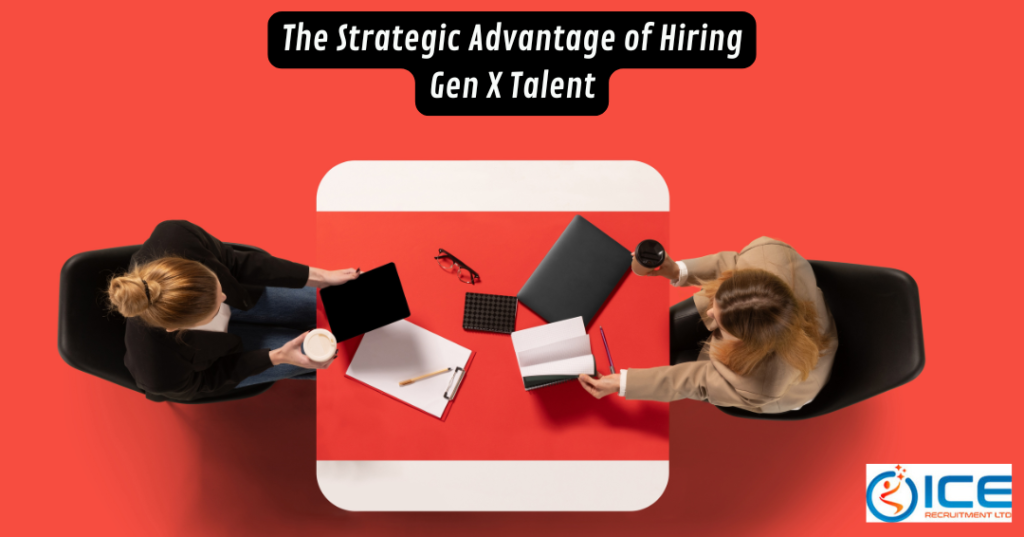Talent marketing in the technology sector is evolving rapidly. Thanks to remote and hybrid work, companies can hire employees from different locations, and modern teams are increasingly made up of multigenerational workforces.
However, as Baby Boomers begin to retire and Millennials and Gen Z candidates capture more attention, one generation needs to be noticed – Generation X. Born between 1965 and 1980, Gen X represents a vital yet frequently underutilised talent pool.
The “silent generation” currently comprises around 23% of the global population and approximately half of all managers. Yet, their quiet, laid-back presence in the workplace means they often don’t get the attention or opportunities they deserve.
In a skills-short market, where access to leadership-ready professionals is limited, organisations need to rethink their approach to recruitment. Investing in Gen X could bring more loyal, experienced, and pragmatic staff to your leadership team.
These employees’ ability to share in-depth institutional knowledge with colleagues, act as mentors, and guide others makes them a valuable addition to the multigenerational team.
However, attracting, managing, and retaining Generation X talent requires a unique strategy. These employees have different values, working styles, and priorities than their peers.
In this guide, we’ll explore the benefits of the “Generation X Factor” in the workplace and share tips for recruiting, engaging, and retaining these critical employees.
The Generation X Advantage for Leading Companies
Born between 1965 and 1980, Generation X occupies a unique position in the workforce. Bridging the gap between Baby Boomers and Millennials, this group brings a results-driven mindset, adaptability, and a wealth of experience to crucial roles.
Growing up through a period of consistent and significant social and economic changes (such as the rise of personal computing and the internet) has given Gen X talent an excellent level of resilience. They’re extremely adaptable at navigating cultural shifts and technological advancements, which is increasingly important in today’s industry.
Gen X employees have already developed various hard and soft skills, working in numerous roles and environments, and have a highly ambitious mindset. Many Gen X staff members progressing into senior roles are driving significant transformation within their organisations.
This generation’s leadership style, which prioritises authenticity and direct communication over rigid hierarchy, has led to the development of more flexible, collaborative company cultures. Gen X is even helping to drive the future of flexible work forward. According to a Stanford University study, 50% of Gen Xers prefer to work remotely at least half the time (even more than Gen Z).
That’s likely because the “sandwich” generation (as they’re sometimes called) often balances responsibilities for ageing parents and dependent children, making flexibility critical.

The Benefits of Hiring Gen X Employees
With their strong work ethic, extensive experience, and resilience, Gen X employees are perfectly positioned to bridge the leadership gaps. However, according to Harvard Business Review data, around 66% of Gen X staff had received only one promotion or none in their recent careers. The silent generation is constantly overlooked compared to Baby Boomers and millennials, but there are many reasons why they shouldn’t be, such as:
Incredible Leadership Potential
Gen X professionals have many skills to contribute as leaders. As mentioned above, while Millennials are often recognised/recognized for their technology proficiency, Gen X was the first tech adopter – they even use social media more than any other generation.
- Gen X has also developed exceptional adaptability and strong problem-solving skills over the years. They are known for their strong work ethic and focus on efficiency. Beyond that, their experience makes them the perfect mentors for new employees, ideal for companies interested in developing a culture focused on continuous learning and development.
Enhanced Succession Opportunities
- With extensive tenure in the space, Gen X employees possess deep institutional knowledge. Their loyalty and long-term commitment to organizations facilitate preserving and transferring critical information and best practices. Mentoring younger colleagues ensures that valuable insights and organizational history are passed down.
- As Baby Boomers retire, Gen X team members are well-prepared to step into leadership positions and even guide the development of younger professionals who may later move into critical roles. This allows for exceptional succession planning and greater business sustainability.
Improved Team Dynamics
- Positioned between Baby Boomers and Millennials, Generation X serves as a bridge across generational divides. Their adaptability and collaborative nature enable them to mediate differing perspectives, fostering cohesive and productive teams. This will be particularly important as teams become more diverse in the years ahead.
- Additionally, while Gen Z and millennial employees are often seen as the drivers of innovation, Gen X employees can nurture this innovation while offering insights based on established best practices and previous experience. This can help ensure that new processes and technologies are implemented thoughtfully and cautiously in the workplace.

Strategic Recruitment Imperatives: Hiring Gen X
Attracting and hiring Gen X employees requires a unique approach from business leaders and hiring managers. Everything from how you “position” your value proposition as an employer to the resources you use to find and identify talent may need a rethink.
Here are some of the key things you’ll need to think about:
Value Proposition Development: Appealing to Gen X
- Let’s start with your employer’s value proposition. Like most employees today, Gen X candidates demand fair, competitive remuneration packages, particularly those that account for their extensive experience and versatile skills. You’ll likely struggle to attract a quality Gen X employee with an entry-level salary.
- However, compensation isn’t all that matters to Gen X. These employees also appreciate flexibility in their work hours and locations. They’re juggling responsibilities like caring for parents and children and potential health issues, so flexible work opportunities will make your offers more appealing. Gen X also wants to see opportunities for growth in their careers.
- Versatile learning and development programs, mainly external training initiatives, will make your company more attractive to Gen X staff. In one study, around 67% of Gen X leaders said they want coaching from “external” parties.
Adjusting Your Recruitment Approach
- When attracting Gen X employees to your company, make it clear your company is specifically looking for them. If your recruitment materials are all tailored to suit the language and preferences of millennials and Gen Z, you won’t connect with the right employees.
- Think carefully about your employer’s branding and messaging strategy. Highlight benefits in your job descriptions that specifically appeal to these candidates. For instance, focus on job stability, opportunities for advancement, and work-life balance.
- When actively seeking out candidates, job fairs and graduate schemes won’t usually be a good option for Gen X. However, you’ll be able to connect with passive candidates in other roles by partnering with recruitment agencies. It would help if you also looked at digital channels, like LinkedIn, to connect with active and passive job seekers.
- When assessing and interviewing Gen X candidates, it is crucial to focus on reducing bias and maintaining fairness. Keep the candidate’s “age” out of your mind completely. Use standardised/standardized assessments to measure leadership capabilities, technical skills, and personality attributes relevant to your business.
- Additionally, remember to take a careful approach when presenting job offers. Salaries need to be competitive, but consider each candidate’s additional needs, such as retirement plans, health benefits, and flexible work schedules.
Ensuring Organisational Readiness
Most companies should be prepared to integrate Gen X employees into their workforces. However, it’s worth quickly auditing your environment, just in case. First, think about culture. Gen X professionals value direct communication, autonomy, and a results-oriented approach. A strict and rigid hierarchy might not appeal to them.
- Prepare your management teams to understand and leverage Gen X employees’ unique strengths. This includes providing opportunities for independent work, recognizing their contributions, and offering flexible work arrangements to support work-life balance. Empathetic leadership that values experience and fosters trust is crucial.
Look for ways to streamline team integration. Focus on cross-collaboration between Gen X and other generational cohorts with unique projects and knowledge-sharing opportunities. Implement two-way mentoring strategies so younger and older generations can easily share perspectives, insights, and skills.

Embedding Gen X into the Workplace: From Onboarding to Retention
Gen X employees aren’t new to the workplace, but countless companies still struggle to take full advantage of their unique strengths. Although Gen X employees are notoriously loyal to their employers, ensuring you can keep these staff members engaged and minimising/minimizing the risk of turnover requires a multi-faceted approach.
Here are some key areas to concentrate on as you integrate Gen X into your workforce:
- Achieving Onboarding Excellence
The onboarding experience you implement for Gen X staff members is likely to be very different from the one you’d use for Gen Z or millennial staff members. These team members don’t need extensive training to understand how your business works, and they can usually adapt to new technologies and processes quickly.
The best strategy is to take a personalised approach that acknowledges each candidate’s extensive experience and values. Learn about what they did in their previous roles and offer direct guidance and support from buddies and mentors to help them transition into new positions—particularly in the leadership space.
Additionally, ensure you have a clear strategy for improving connections between Gen X and your existing team members. Most Gen X staff members are naturally collaborative, but they may need support to connect with relevant team members, and get to know their ways of working. Consider using team building exercises to bring staff together and facilitate regular knowledge sharing with weekly meetings or connectivity sessions.
- Creating Career Development Pathways
As mentioned above, Gen X employees may have accomplished more in their careers than millennials and Gen Z staff already – but they still want room to grow. When you hire a new staff member, arrange a meeting to discuss future opportunities and goals. Create a clear pathway into leadership positions, allowing your team members to lead projects, participate in decision-making processes, and access leadership training programs.
When it comes to skill enhancement, be flexible. Gen Xers appreciate personalised development focused on their goals and roles. They also like the autonomy to choose their own learning styles, whether that means sourcing external mentors or attending online courses in their spare time. Provide a wide range of options to choose from, from workshops and seminars to digital courses and flexible mentorship programs.
- Developing your Retention Strategy
Gen X employees might be loyal but won’t stick with a company that doesn’t adapt to their values and priorities. Holding onto these crucial employees means taking an end-to-end approach to delivering the benefits and experiences they crave.
As mentioned above, delivering career progression opportunities is crucial, as Gen X staff members still want to move forward in their roles. According to HBR, only 58% of Gen X employees feel they’re making progress at an exceptional rate, compared to 66% of millennials.
- Organizations should establish clear promotion pathways, provide leadership development programs, and ensure that advancement criteria are communicated effectively. Beyond that, companies should focus on:
- Work Flexibility
Balancing professional responsibilities with personal commitments is crucial for Gen X employees, who manage children and ageing parents. Offering flexible work arrangements, such as remote work options and adaptable schedules, can alleviate stress and enhance productivity.
- Tailored Benefits
Tailoring benefits to meet Generation X’s specific needs is essential. This includes providing comprehensive health insurance that covers preventive care, retirement planning resources, and wellness programs. Given their dual caregiving roles, benefits such as dependent care assistance and family leave policies can be particularly valuable.
- Enabling Knowledge Sharing
Leveraging Gen X employees’ extensive experience through knowledge-sharing initiatives can be highly beneficial. Implementing mentorship programs where Gen Xers mentor younger colleagues facilitates the transfer of institutional knowledge.
This means that even if your Gen X staff members retire or move elsewhere, you won’t miss out on the unique experience and expertise they can bring to your team. Plus, creating mentorship programs can give Gen X staff a greater sense of purpose and pride in their role, which can help increase retention rates.
- Providing Regular Recognition
Constant feedback and recognition will be crucial throughout your Gen X employee’s development. These team members value formal and informal recognition reflecting their achievements and impact. Implementing programs celebrating milestones, providing constructive feedback, and offering tangible rewards can enhance their motivation and loyalty.
Personalisation/Personalization is important here, too. Be ready to adapt your approach to delivering recognition to each employee’s specific preferences. Some prefer public recognition, while others prefer quiet “thank you” notes and rewards.
Managing Gen X and Mitigating Risks
Managing Gen X employees can be a little complex, as they generally already have the skills and experience to act in “leadership” positions themselves. To make sure you’re prepared to get the most out of your experience team members, focus on:
Providing the Right Resources
- Don’t think that Millennials and Gen Z employees are the only tech-savvy staff members. Remember, Gen X employees are also comfortable with technology and can adapt faster to new processes and tools than some of their counterparts. Ensure they can access the latest innovations and solutions for their work.
- Provide training, when necessary, for both technical and leadership skills, particularly for those who could be moving into management positions in the future. Additionally, ensure your Gen X team members can access the resources they need to enable work-life balance.
Adapting Management Strategies
- Gen Xers value autonomy and efficiency in their work. This means micromanagement can often be counterproductive. Give your staff the space they need to carry out their roles in a way that makes sense for them. Provide them with guidelines to follow, support when necessary, and goals to achieve, but trust them to use their time effectively.
- Ensure your management teams also provide these staff members with constant, honest feedback. This will help your team members understand their performance strengths and areas for improvement. Additionally, managers should be made aware of how to measure the performance of Gen X staff members.
Risk Mitigation
Gen X employees can deliver exceptional benefits to teams, but there are potential risks to consider, too. One potential problem is misalignment between these employees and team members from other generations with unique working styles. Fostering cross-functional collaboration so teams can learn how to work effectively together can help here.
Providing access to training initiatives focused on cultural sensitivity and emotional intelligence could also help all employees from different backgrounds and environments work together more harmoniously. Another potential risk to avoid is the potential to overlook Gen X contributions.
Since Gen X team members tend to work in a “heads-down” approach, it can be easy to overlook when they’re burning out. Ask them how they’re doing, whether they need extra support or guidance, and if they need help in any areas.
Tracking the Results of Gen X Employees
So, how do you know if your Gen X employees are paying off? Calculating the ROI of any staff member can be complicated, but there are several core factors you can look at to give you an insight into the value of Gen X team members.
Calculating the Cost of Your Employees
You may need to offer higher salaries and more advanced benefit packages to attract these team members. Additionally, since many will already be involved in existing roles, you may need to work with recruitment companies to access passive candidates and increase your talent pool. Remember, though, that the investment in hiring Gen X employees is often quickly offset by their ability to integrate into your business and contribute significant leadership value quickly.
They’ll also be able to enhance the impact of your other development programs by acting as mentors to your other team members and sharing their knowledge and experience with staff.
Examining Hiring Outcomes
Once you understand the costs associated with hiring Gen X employees, you can begin to evaluate your return on investment. First, consider your employee retention rates. High turnover rates often lead to increased recruiting and training costs.
Since Gen X employees are highly loyal, you may find that your retention rates are much higher with these staff members – particularly if you follow the tips provided above.
Next, look at Gen X’s impact on your company’s performance. Gen X employees often bring a wealth of experience and a strong work ethic, directly influencing a company’s performance. Their contributions can be measured through key performance indicators (KPIs) such as productivity levels, quality of work, and leadership effectiveness.
Finally, consider the overall “value” you get from the knowledge Gen X staff members bring to your business. The institutional knowledge possessed by Gen X employees is invaluable. Their deep understanding of industry practices, organizational history, and professional networks contributes to informed decision-making and mentorship of younger employees.
X Marks the Spot: Investing in Your Leadership Team
Generation X employees are frequently overshadowed by their larger generational counterparts. However, they could be pivotal to driving the success of your company. With their adaptable, resilient, and pragmatic nature and exceptional industry experience, they bring incredible value to growing teams.
Gen X staff members could help foster a new collaborative, adaptable environment in your business, paving the way for a company culture built on knowledge-sharing, flexibility, and consistent growth. The key to success is learning how to attract these employees and embed them into your business on a broad level.
The guidance above should help you unlock more of the potential that Gen X employees offer. But if you need more help tapping into this overlooked market, working with a professional recruitment team could be the perfect solution. Your recruitment company can help you find passive and active job candidates from the Gen X cohort and even assist you with positioning your company as the perfect employer for their needs.



